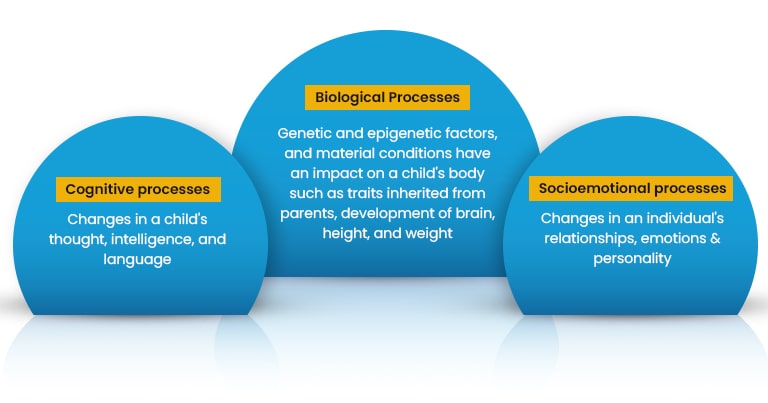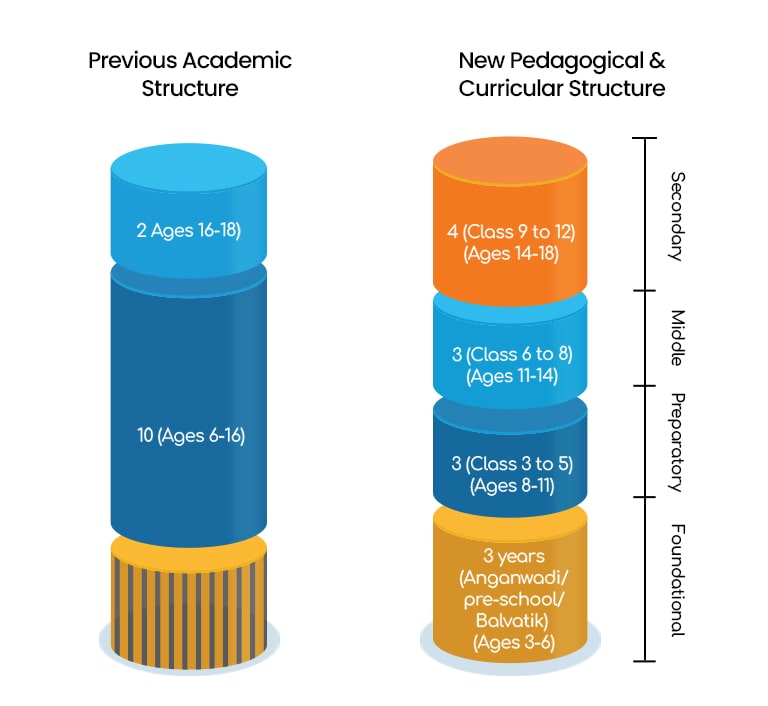The New Education Policy 2023: A Detailed Analysis
The education industry has been involved in extensive discussions about revamping the entire education framework while implementing the National Education Policy 2020. They have expressed the need to move beyond traditional memorization-based learning and incorporate practical knowledge into children’s education. The modern education system has been centered around the new 5+3+3+4 education system for schooling and digital inclusions in education.
In a recent announcement, a new grade structure for school students was unveiled, which involves conducting examinations solely for Classes 3, 5, and 8.
The assessment approach for other academic years will undergo a transformation under the new education policy 2023, emphasizing a regular and formative style that focuses on fostering competency-based learning and development. This shift aims to assess higher-order skills like analysis, conceptual clarity, and critical thinking.
So without further ado, let’s decode the 5+3+3+4 education system.
What is the 5+3+3+4 Education Structure?
Contrary to common misconceptions, the 5+3+3+4 system does not result in an increase in the total number of school years for students. Instead, it redefines the structure of formal education. Under this system, playschools are integrated into the formal education framework, combining nursery and kindergarten classes with classes 1 and 2.
The development of a child is shaped by the dynamic interaction of three distinct processes: biological, cognitive, and socio-emotional. These processes are intricately interconnected, with each influencing the other. Both the body and mind of a child are interdependent, and all three processes contribute to their overall development.

source: education.gov.in
Keeping the above-mentioned factors in mind, this new education framework aims to create a more seamless transition between early childhood and primary education, blurring the boundaries between curricular and extracurricular activities, along with academic and vocational pursuits.
The 5+3+3+4 education system restructures the entire schooling period to enhance accessibility, responsibility, and universalization at the preschool level (Early Childhood Care and Education or ECCE). It also extends the application of the Right to Education Act to encompass individuals aged 3 to 18, aiming to provide a higher-quality learning environment in a modern education system.
Now let’s dive deeper and discuss a breakdown of the 5+3+3+4 education system.

1. Foundational Stage (5 years)
- Students aged 3 to 8 years old are included.
- This stage encompasses Preschool, Anganwadi, and classes 1 to 3.
- As per the guidelines of the National Education Policy 2020, the Foundational Stage involves three years of preschool or Anganwadi education, followed by two years of primary school (classes 1 and 2).
- The primary emphasis during this phase is on implementing play-based or activity-based learning strategies and promoting language development among students.
2. The Preparatory Stage (3 years)
- Caters to children aged 8 to 11.
- This stage encompasses classes from third to fifth grade.
- It emphasizes activity-based learning, interactive teaching methods, and the cognitive development of children.
- Language and math skills remain a key focus.
- Children will be exposed to the learning of three languages, with the choice of languages being determined by the state.
- Incorporates play and activity-based approaches to teaching and learning. It places importance on fostering classroom relationships and promoting a sense of discovery among students.
3. The Middle Stage (3 years)
- Designed for students aged 11 to 14.
- It encompasses classes from 6th to 8th grade.
- The pedagogical approach shifts towards a more flexible style of education. Departing from the traditional rote learning methods, the new model emphasizes the importance of critical learning objectives at this level of schooling.
- Students will delve into fundamental subjects such as physics, social science, mathematics, arts, and humanities.
4. The Secondary Stage (4 years)
- Caters to students aged 14 to 18.
- It encompasses classes from 9th to 12th grade.
- The policy aims to eliminate the segregation of students into distinct streams and instead offers a multi-stream system where students can choose a diverse range of subjects. This system allows for greater flexibility, enabling a student to, for example, combine History with Chemistry and Economics, thus resolving the longstanding divide between different streams of education.
- The emphasis on cultivating critical thinking skills and fostering mental agility continues in this stage.
Now let’s explore the benefits of the new education framework.
Advantages of the 5+3+3+4 Structure
Establishing a Strong Foundation:
- India faces significant challenges in transitioning children from Anganwadis and playschools to formal schooling. It is crucial for children to have a solid foundation at the basic level to ensure continued learning as they grow older.
- Including children aged 3 to 6 in formal schooling emphasizes the importance of early development.
- Without essential language and numerical skills, students may struggle to learn independently. A weak foundation can significantly hinder self-learning.
Significance of Early Childhood Care and Education (ECCE):
- Both academics and practitioners recognize that Early Childhood Care and Education (ECCE) plays a vital role in shaping a child’s future. Incorporating pre-primary education within the scope of the NEP is considered a significant accomplishment.
- By recognizing the importance of ECCE, the NEP aims to set children on a path towards long-term success.
Improved Career Counselling:
- The new schooling system, with its multidisciplinary education and subject selection during middle school years, facilitates more effective career counseling services.
- Allowing students to choose their favorite subjects during middle school helps them guide their own careers, eliminating the responsibility of making career decisions on parents or instructors who may not always be adequately prepared for this task.
The Significance of Digital Inclusions in NEP 2023
The National Education Policy (NEP) 2023 recognizes the significance of digital inclusion in the field of education and outlines several initiatives to harness the potential of technology in improving the quality of education. These initiatives are designed to promote digital teaching methods, provide resources and support for teachers and students, and integrate technology into classrooms for a more engaging learning experience.
One of the key measures outlined in the NEP 2023 is the establishment of the National Educational Technology Forum (NETF). This forum serves as a platform for educational institutions to share innovative ideas and strategies related to digital education. By promoting collaboration and knowledge-sharing, the NETF aims to enhance the implementation of digital education in schools across the country.
To ensure that teachers and students have access to high-quality digital learning materials, NEP 2023 introduces a new unit that operates nationwide. This unit will focus on developing and curating digital resources, including learning materials and tools, to support teachers in their instructional practices and facilitate effective learning for students. By centralizing the development and curation of digital learning resources, this unit aims to provide equitable access to educational materials and promote consistency in the quality of digital resources.
Additionally, NEP 2023 emphasizes the integration of technology in classrooms. This integration involves leveraging technology for instructional delivery, digital assessment methods, and classroom management. By incorporating technology into these aspects of education, the NEP envisions a more streamlined and efficient educational process. Digital platforms and tools can enable teachers to deliver engaging and interactive lessons, facilitate personalized learning experiences, and provide real-time feedback to students. This integration aims to create a dynamic learning environment that caters to the diverse needs and learning styles of students.
Overall, the digital inclusions outlined in the NEP 2023 are designed to leverage technology to enhance the overall quality of education. By promoting digital education, providing resources and support, and integrating technology into classrooms, the government aims to ensure that students have access to diverse digital resources and innovative teaching methodologies. These initiatives aim to create an inclusive and empowering educational ecosystem that equips students with the skills and knowledge needed to thrive in the digital age.
The Möbius platform plays a vital role in the National Education Policy (NEP) 2023.
As we talk about the future of education, let’s discuss Möbius. It is an interactive and intuitive digital learning platform offered by DigitalEd India, aiming to foster a futuristic digital education ecosystem for STEM learners and educators. It facilitates a blended learning environment with features like user-friendly UI, in-line questions, algorithmically randomized questions, powerful multimedia visualizations, instant feedback, and more.
Here’s how Möbius facilitates the digital inclusions outlined in the policy:
• Design, develop, and deploy accessible digital courses and content repositories.
• Enable collaboration among educators and students to enhance course content and teaching methodologies.
• Integrate multimedia visualizations to modernize education and increase knowledge.
• Foster a blended learning environment with an all-encompassing digital platform for STEM education, ensuring consistency between classroom learning and outside-the-class learning.
• Evaluate students through a digital assessment platform with various pathways for assessment like in-line questions, algorithmically randomized questions, adaptive questions, and more.
• Enhance connectivity between students and educators, enabling valuable and timely feedback.
…and more
Want to explore the Möbius experience? Book a product demo today!
Want to learn more about the New Education Policy (NEP) 2023? Click here!